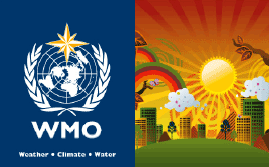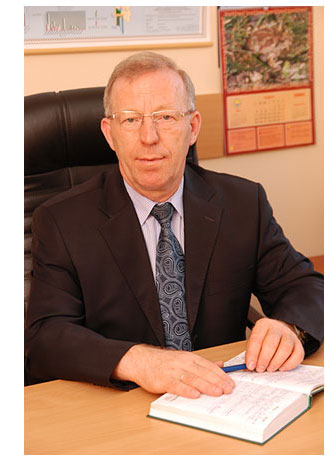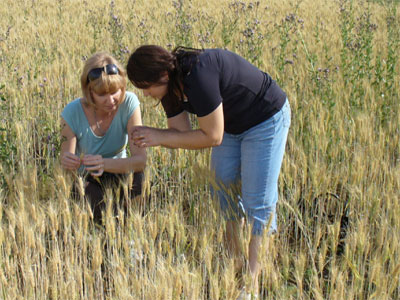|
23 March – World Meteorological Day
Interview with Dr. Ilie Boian, Director of the State Hydrometeorological Service
- Every year, on 23 March, we celebrate the World Meteorological Day. This Day commemorates the entry into force, on that date in 1950, of the WMO Convention. Subsequently, in 1951, WMO was designated as a specialized agency of the United Nations System. As a result, a new era of international collaboration in the field of hydrology and meteorology appeared. WMO significantly contributed to the establishment of global operational systems, aimed at life, livelihoods, property, health and well-being protection and at natural disaster risk reduction activities. The Republic of Moldova joined the World Meteorological Organization on 29 July 1994, according to the Parliament Decision nr. 210-XIII. Thus, the State Hydrometeorological Service, as an institution subordinated to the Ministry of Environment, represents and promotes the interests of the Republic of Moldova in the fields of meteorology, hydrology and environmental quality monitoring in collaboration with international organizations and hydrometeorological services of other countries. Also, I would like to mention that the success of WMO activities consists in an international collaboration, as weather and climate do not have administrative or economic borders. - What is the difference between the celebration of this day in 2011 from the previous years? - Every year on 23 March, WMO celebrates the World Meteorological Day focusing on a certain up-to-date theme. The theme of 2011, proposed by WMO, is „Climate for You”, in recognition of the scientific and socio-economic benefits derived from hydrometeorological observations and measurements at global, regional and national levels in the context of global climate change. As WMO has recently reported, 2010 was the warmest year on record, at the same level as 1998 and 2005, since the relative differences between the three years were less significant than the uncertainty margin, which only confirms the observed long-term warming trend highlighted by the IPCC report, for all of the ten warmest years on record were experienced since 1998. Additionally, over the ten years elapsed since 2001, global temperatures averaged almost half a degree above the 1961-1990 mean, the highest ever recorded for any 10-year period since the beginning of instrumental climate observations. In a relative short period of time – 61 years – WMO has come to represent an important factor in different spheres of human activity, exceeding the expectations of its founders. Presently, because the atmosphere has no administrative or political border, WMO represents a unique structure for the international hydrometeorological and climatic data exchange. WMO tends to ensure population’s security and health, and to build capacities of natural hazards monitoring and impact reduction. “WMO activities in the area of climate are widely perceived today as key contributions to human safety and well-being and the realization of economic benefits for all nations, thereby bringing us even closer to the spirit of our founding mandate, the WMO Convention, which came into force sixty-one years ago on this date, as well as to the patrimony of the former International Meteorological Organization (IMO) established by the First International Meteorological Congress (Vienna, September 1873)”, said Michel Jarraud. WMO coordinates the efforts of National Hydrometeorological Services (NHMSs) in natural hazards impacts mitigation, by issuing early warnings and forecasts, as well as by risk assessment and awareness rising of meteorological and hydrological information. WMO has a long experience in observation, exchange and storage of the data on weather, climate and water. By transferring technology, providing services for capacity building, software for data administration and storage, WMO aims to ensure the NMHSs capacity, especially in the developing countries. Moreover, WMO’s effort to better integrate its observing systems is a significant contribution to the initiative of the international Group on Earth Observations to develop a Global Earth Observation System of Systems (GEOSS) by building upon the existing national, regional and international systems, to further integrate their respective competencies. The global WMO network consists of more than 12000 meteorological stations, the Specialized Regional Meteorological Centers and World Meteorological Centers offer operative data, analyses and forecasts that allow the NMHSs to issue early warnings and directions for different natural hazards, such as tornados, tropical cyclones, heat and cold waves, floods and droughts. - What can you tell us about the main task of the State Hydrometeorological Service? - An important strategic task of the State Hydrometeorological Service (SHS) is the timely warning of unfavourable hydrometeorological phenomena and of high pollution levels. SHS monitors the environment and issues warnings regarding the unfavourable conditions. In cases of danger, the information is immediately transmitted to state organizations, economic agents and mass media in order to protect the population and national economy from severe hydrometeorological phenomena and to prevent or reduce the potential damages. One of the up-to-date methods of reducing extreme hydrometeorological hazards losses is the modernization of existing early warning systems. Anticipating the risks, but having no possibilities of avoiding them, we can still undertake some measures of impact mitigation. Also, experience shows that, on one hand, different economy branches demand more meteorological information, especially regarding the forecasts veracity and early warnings, but, on the other hand, the provided meteorological data is usually not used fully, and sometimes incorrectly, thus reducing the efficiency of the economical decisions. In order to implement successfully the disaster risk reduction measures, using rationally the natural resources, it is necessary to research multilaterally these phenomena, to improve forecasting and damage prevention/reduction methods. Nowadays, the World Meteorological Day strengthens the hope that our society will acknowledge the role of the SHS and its importance for the present and the future of the country, as well as for the day-by-day safety of the society. - What was the impact of global climate change on Moldova’s climate? - Climate monitoring is vital for the climate system complexity acknowledgement and its predictability. Economic activity goes along with meteorological phenomena and climate change. Without possessing climate information, one cannot choose the location of cities, infrastructure, roads, create dams and water reservoirs and determine air trajectories. Taking into account the economic conditions of our country, it is extremely important to be aware of the weather influence on agriculture, which is very sensitive to climate variations. Efficient usage of meteorological information can have positive economic impacts and can benefit the population. Using renewable energy resources (solar, eolian) makes it possible not only to reduce production and provision costs of fossil fuels from other countries, but also to improve the environment’s ecologic status. In the same time, climate information allows disaster risk forecasting and reduction. The last 20 years in Moldova (1991-2010) differ from the previous periods with a high temperature regime. The average air temperature during a year in Chisinau was of 10,4°Ñ, 0,9°Ñ above the norm. During this period, there were registered 8 ”booms” of high annual average temperatures– 1994 (11,3°Ñ), 1999 (11,0°Ñ), 2000 (11,2°Ñ), 2002 (10,8°Ñ), 2007 (12,1°Ñ), 2008 (11,3°Ñ), 2009 (11,4°Ñ) and 2010 (10,6°Ñ), 1,1-2,6°Ñ above the norm. The winter-spring-summer season was significantly warmer in the last 20 years (approximately by 1°Ñ). The highest temperature recorded on the territory of the Republic of Moldova (+41,5°Ñ) during the whole period of observations was registered on 21 July 2007 (MS Camenca), while 2007 was the warmest year in the history of meteorological observations. The annual quantity of precipitations does not differ significantly during a period of 20 years. During the years 1991-2010 there was a deficit of precipitations in the summer period (1992, 1995, 1996, 1999, 2007 şi 2009), almost twice higher than during the period 1971-1990. The thermal regime in Moldova, as opposed to the global temperature, was higher during 2010. According to the Chisinau meteorological station data, the average air temperature was 10,6°Ñ (1.1°Ñ above the norm) and ranged as the ninth in the record of high annual average temperatures. Such figures are recorded in average once in 8 years, but more often in the last 20 years – in average once in two years. - The State Hydrometeorological Service has a fruitful cooperation with WMO, what are the advantages of this collaboration? - The State Hydrometeorological Service of the Republic of Moldova is a special institution, which monitors the weather and its evolution, prevents the severe meteorological events, and carries out the monitoring of environmental pollution. The first instrumental meteorological observations started in Chisinau in 1844. International cooperation in related fields is the milestone that ensures the Service’s sustainable run. Hydrometeorological observation data collected by the national services are disseminated to the synoptic mapping and near-time forecast World and Regional Centers. WMO provides the Service with both technical assistance and financial. Due to this assistance the experts of our Service participate to international conferences, workshops and training courses. - What about the regional cooperation of State Hydrometeorological Service? - At the moment, the Service assists within the regional projects on exchange of hydrometeorological information between the Danube (DANUBE – HYCOS) and Black See Countries (BLACK SEAHYCOS). Also, in November 2010, within a EUMETSAT regional project, a DAWBEE station of satellite data reception and visualization was installed; it monitors cvasi-real the atmosphere, the evolution of cloud systems, field moisture parameters, meteorological phenomena etc. The State Hydrometeorological Service has an adequate network of stations and water gauges, in order to observe systematically meteorological and hydrometeorological events and control the environmental pollution level, that exchanges information with the Services of the neighbour countries. State of the art technology for processing related information is used and prepared. The Sate Hydrometeorological Services signed bilateral agreements with National Hydrometeorological Services. It has strong relationships with neighbouring national hydrometeorological services. In order to strength the collaboration, the Service develops long-term intergovernmental programs with the Ukraine and Romania. The agreements pledge to exchange of information and monitoring of the water resources in the border rivers Nistru and Prut. - Which are the perspective goals of the Service? - Based on the „National Ecologic Security Program for 2007-2015”, a prospective plan was elaborated to support the development and consolidation of the SHS potential. In order to achieve this desiderate, important activities were undertaken with the financial support of the Government and of the National Ecologic Fund to modernize and optimize the main SHS productive subdivisions, inclusive of the National Observation Network. Automatic meteorological posts, up-to-date equipment for several hydrological and hydrochemical posts were purchased and partially installed. Therefore, SHS is responsible for providing information and data on possible scenarios regarding climate and weather change to the decision makers. For this, it is necessary to completely modernize the Sate Hydrometeorological Service. This would allow the transition to a new phase of activity. Such investments are justified by the economical benefits that would result from the correct use of the hydrometeorological information. The benefit could be at a 1-10 proportion. The project “Disaster and climate risk management in Moldova” started in the autumn of 2010. It was implemented by the World Bank in cooperation with the International Development Agency. This project is an important step in the activity of strengthening and integration of disaster risk management at national and regional level. The objective of the project is the reduction of the country’s vulnerability to natural disasters. It will be achieved inclusive by consolidating the meteorological monitoring in the country, thus contributing to maximum anticipation issuing of weather related warnings, to timely provision of high veracity hydrometeorological forecasts and of other information services. A series of activities for the modernization of the existing system are planned to be undertaken within the project: - Acquisition and installation of a C Band Dual Polarization Doppler Weather Radar that will allow to monitor in real time the evolution of baric formation, an atmospheric fronts in order to forecast with greater anticipation the moment of unfavourable meteorological phenomena triggering, inclusive of heavy rains and potential floods; - Nowcasting system creation to collect, process and disseminate to end users data regarding weather forecasts and early warnings; - New headquarters construction for the meteorological observation stations from Balti, Soroca, Leova and Ceadir-Lunga and automatic meteorological stations installation in these locations; - Continuous automating of the National Observation Network by the installation of actinometrical, precipitations and soil moisture sensors, and of automatic hydrological stations on the Nistru river. Also, 2010 represented an important moment in the development of weather monitoring, water regime and environment quality system in the country. In the conditions of a global economic crisis, the efficient functioning of this system has succeeded and important steps in the SHS capacity building were taken, thus providing the government, national economy, and population with useful strategic information transmitted operatively. Among the performances of 2010 there are: - The issuing of 7 days forecasts; - The alignment to the European standards of the meteorological and hydrological hazards warning system, and of the cases of exceptional and high pollution of the environment, based on the four codes; - The accreditation of the Environmental Quality Monitoring Centers by the Accreditation Centre on Conformation Assessment; - The premiere works regarding the dielectric oil analysis to determine polychlorinated biphenyls; The development prospects outlined and partially implemented in 2010, include continuous modernization and consolidation actions in all the fields of SHS activity: - Further modernization and automation of the meteorological, agrometeorological and hydrological network with the financial and technical support of the World Bank, Czech Government and the National Ecological Fund of the Moldova’s Ministry of Environment; - Implementation of new software and further optimization of the long-term database for the three fields of activity of the SHS; - Purchase of a mobile lab of SHS equipment calibration; - Endowment of the Research and Long-Range Forecasts Center with modern equipment in order to issue officially meteorological forecasts with a month anticipation and to monitor meteo-climatic hazards (including climate change, heat waves, droughts and desertification). - Good things are done by good specialists... - The specialists, act a decisive role in the prosperity of any institution. Starting with 2002, the Government finances the training of meteorology specialists. They are continuously trained to be more qualified and to face the higher demands of the technical and scientific progress, as well as the requests of the hydrometeorological information end users. - What do you wish for your experts in near future? - We express our gratitude on this special day to all meteorology specialists from our country for their hard work, which they are doing for several years and their contribution to the building capacity of the State Hydrometeorological Service as a specialized institution. I wish them to be aware that the quality of the information and services provided by them is critical for life security, for national economy progress and for environment sustainability. Successes and new accomplishments!
|










